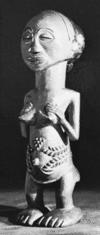- Luba
-
1. a member of any of various groups of agricultural and hunting people inhabiting the SE Democratic Republic of the Congo, some of whom are famous for their wood carvings.2. Also called Chiluba, Ciluba, Tshiluba. the Bantu language of the Luba, used as a lingua franca in the S Democratic Republic of the Congo.
* * *
or BalubaCluster of some 5.6 million Bantu-speaking peoples who share a common political history surrounding the Luba-Lunda states. They are savanna and forest dwellers who hunt and gather, engage in agriculture, and keep livestock; they also fish intensively in the Congo and its tributaries. They have associations for hunting, magic, and medicine and a well-developed oral tradition that includes epic cycles. Two groups are noted as wood-carvers. Female Luba ancestral statue of carved wood; in the Musée de l'Homme, Paris.Courtesy of the Musee de l'Homme, Paris
Female Luba ancestral statue of carved wood; in the Musée de l'Homme, Paris.Courtesy of the Musee de l'Homme, Paris* * *
▪ peoplealso called Balubaa Bantu-speaking cluster of peoples of south-central Congo (Kinshasa). Numbering about 5,594,000 in the late 20th century, they inhabit a wide area extending throughout much of southern Congo. The name Luba applies to a variety of peoples who, though of different origins, speak closely related languages, exhibit many common cultural traits, and share a common political history with past members of the Luba empires, which flourished from approximately the late 15th through the late 19th centuries. (See Luba-Lunda states. (Luba-Lunda states)) Three main subdivisions may be recognized: the Luba-Shankaji of Katanga, the Luba-Bambo of Kasai, and the Luba-Hemba of northern Katanga and southern Kivu. All are historically, linguistically, and culturally linked with other Congo peoples. The Shankaji branch is also connected with the early founders of the Lunda Empire.The Luba are savanna and forest dwellers who practice hunting, food gathering, and agriculture (cassava, corn [maize]), keep small livestock, and live in villages of a single street, with rectangular thatched-roof huts along either side. They fish the Congo and its main tributaries intensively. In the 16th and 17th centuries, most of the Luba were ruled by a paramount chief (bulopwe, or balopwe), although smaller independent chiefdoms already existed. The breakdown of the empire resulted in the development either of smaller chiefdoms or of small autonomous local lineage groups. Luba practice circumcision and women's initiation; they have associations for hunting, magic, and medicine. They have a strong belief in a supreme being and worship ancestors and natural spirits. Literature, including epic cycles, is well-developed. The Shankaji and Hemba are renowned wood-carvers; they are especially known for their carvings of anthropomorphic figures, ceremonial axes, and headrests.* * *
Universalium. 2010.
